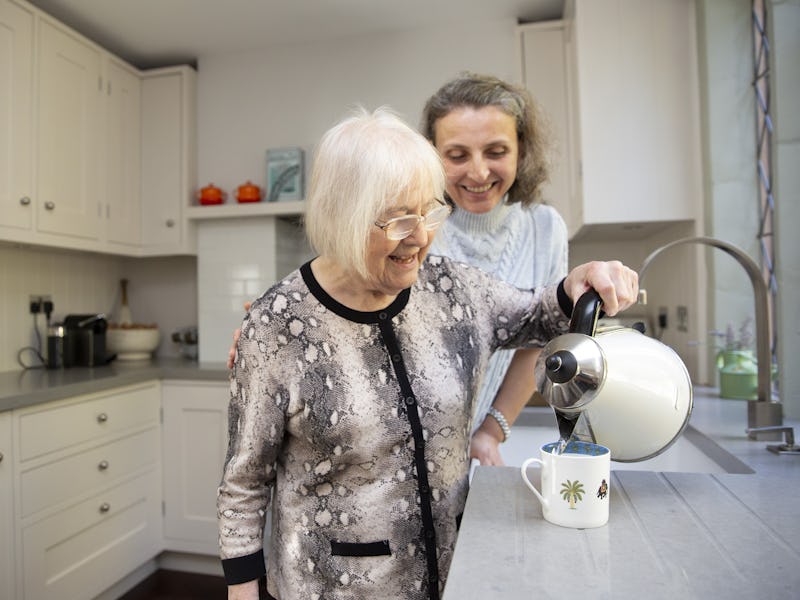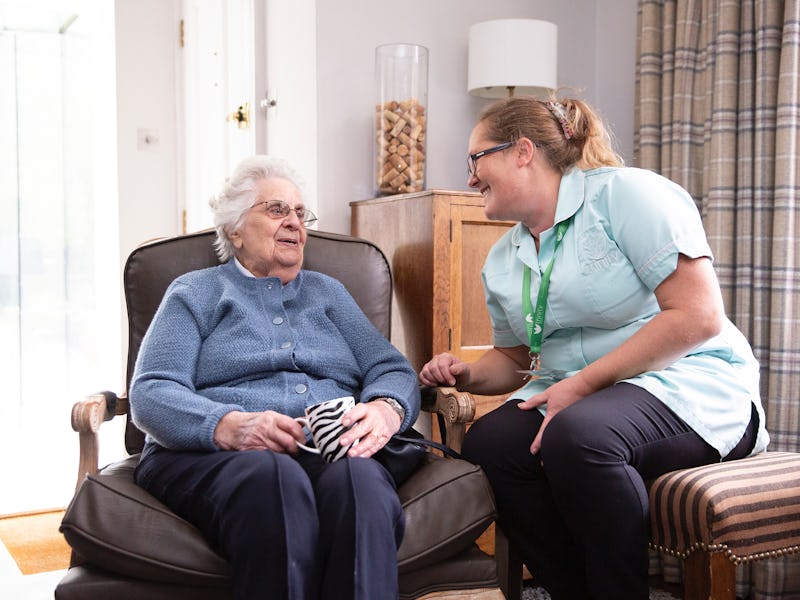| Previous Page: Tips for Living with Dementia | Next Page: Useful Resources |
|---|
Even if you’ve been aware that your loved one has been displaying symptoms of dementia for some time, a formal diagnosis can still feel like a shock. You’ll naturally feel concerned for your loved one’s wellbeing and how you can support them, but it’s important to remember that your wellbeing is also important when caring for others.
Caring for a loved one can be both a rewarding and isolating experience. Your commitment to caring for your loved one can often lead to you disregarding your own wellbeing because you may feel guilty or anxious when leaving them for any amount of time from 5 minutes to 5 days. It’s absolutely essential to find a balance between caring for both your loved one and yourself. If you’re finding it increasingly difficult to manage the care of a loved one, seeking support is vital. If you’re feeling overwhelmed:
Share the care
Sharing your responsibilities with others can be immensely beneficial for everyone. By introducing a care provider, your loved one will receive regular support from specially trained and experienced professionals who have committed their careers to providing compassionate care to those living with dementia. Regular care visits will enable you to pursue your own lifestyle with the reassurance and peace of mind that your loved one is receiving bespoke, heartfelt care. Being cared for by different carers can be a really positive experience for your loved one too. They’re able to build friendships and engage with new people in the comfort of their own home.
Establish a support network
Your support network may include your loved one, their medical team, local communities and charities, as well as friends and family. In many ways, your lifestyle will undergo changes as your loved one’s dementia progresses, and it’s important to ensure that you are able to share your experiences with others and seek support.
Practical tips for the home:
- Consider colours and patterns in the home. As dementia affects perception, dark coloured rugs can sometimes look like holes in the floor, and switches that are the same colour as walls can be difficult to see.
- Help your loved one keep a diary of things they want to remember
- Pin a weekly timetable somewhere that’s easily accessible
- Put emergency items such as a phone within their reach
- If your loved one has a daily newspaper delivered to remind them of the date and day, clear away old papers to avoid confusion
- Help your loved one locate household items by labelling cupboards or drawers
- Place helpful telephone numbers by the phone
- Leave reminders in helpful places – for example, put a note on the front door to take their keys
- Install safety devices, such as gas detectors and smoke alarms
- Ease the stress of paying bills by setting up direct debits
- A pill organiser box can be helpful for remembering which medications to take and when
Making decisions on behalf of a loved one
As dementia progresses and reaches more advanced stages, the thought processes and ability to make decisions become increasingly difficult. This implicates an individual’s ability to consent to decisions about their care.
At this stage, your loved one may need to be assessed to determine their mental capacity.
Mental capacity
As dementia progresses, the structures in the brain that are responsible for problem-solving, reasoning, thought processing and decision-making functions may become affected. Just as the type and progression of dementia is unique to each individual, the extent to which dementia affects mental capacity will vary, for example, someone may lack capacity to decide on complex financial issues but the capacity to make other decisions such as which items to buy at the local shop remain unaffected.
The more advanced stages of dementia may struggle to make and communicate their decisions. At this stage, your loved one may benefit from a mental capacity assessment. Care providers and health professionals are governed by the Mental Capacity Act (MCA), which is designed to protect and restore power to vulnerable adults who lack capacity, as well as those who have capacity and choose to plan for their future.
Five key principles of the mental capacity act:
- Every adult has the right to make his or her own decisions and must be assumed to have capacity to do so unless it is proved otherwise
- All practicable effort should be made to encourage and support individuals to make decisions for themselves
- Everyone has their own values, beliefs and preferences which may not be aligned to your own, but this is not a reasonable rationale for assuming mental incapacity
- Anything done for or on behalf of a person who lacks mental capacity must be done in their best interests
- A best interests decision should be the least restrictive option when considering the person’s rights and freedoms of action
Power of attorney
In the event that an individual lacks mental capacity, but decisions need to be made regarding their care, it is advisable for a power of attorney to act on their behalf. A power of attorney can be established through a solicitor. This process is significantly more straightforward if completed whilst the person requiring care has mental capacity to nominate a power of attorney themselves. A nominated attorney has the authority to act legally in their loved one’s best interests for financial and property matters, plus decisions on welfare and medical treatment.
How to behave – act as naturally as possible
Whilst certain cognitive tasks may be more difficult than others, emotions and feelings can remain intact. In the later stages of dementia, when long-term memory becomes affected, your loved one may not remember that their partner passed away and they may request to visit them. If you share the distressing news that they have passed away, your loved one will experience the grief as intensely as if it were the first time, and avoiding traumatic situations is of fundamental importance to maintaining your loved one’s wellbeing. In this scenario, it may be advisable to plan a trip to visit their partner in the future, by which point the arrangement will have been forgotten and their feelings will have been protected.
Clear communication
When caring for your loved one, maintaining their dignity is of fundamental importance. Your loved one may feel distressed as their dementia affects aspects of their everyday life, but by keeping communication clear and simple, you’ll help your loved one feel supported in interaction.
Distract and redirect
There will be times, particularly during the later stages of dementia, when your loved one may struggle to communicate with you or perform a certain task. Sometimes, even attempting to assist them can be extremely frustrating for them, so redirection and distraction can be useful ways to soothe these frustrations. Changing the subject to something new will help engage you both in a new activity.
Allow your loved one to make decisions
Freedom of choice is an important way to maintain independence. Although decision-making abilities may be affected by dementia, there are creative ways to ensure that your loved one is still able to make choices for themselves. Open-ended questions such as “what would you like for dinner?” can cause distress, but enabling your loved one to choose their preference from a selection of options, for example, “would you like shepherd’s pie or fish & chips for dinner?” will protect their freedom of choice and independence.
False truths
As dementia progresses, your loved one may begin to share stories which you know to be untrue. Although human nature would be to correct them, it’s important to understand that the story is true in the mind of your loved one and correcting or challenging them may this may cause confusion and distress.
Keep life positive
A journey with dementia can be distressing for everyone involved, and maintaining a positive outlook in spite of the daily challenges can sometimes feel impossible. But there is joy to be found in every day. Look for elements of happiness and positivity in everyday life and share these with your loved one. Although they may not acknowledge your positivity in a way you’d expect, your influence will help support their mental wellbeing.
Be open and honest
If a friend or family member finds it hard to talk about dementia, make the first move and explain how they are able to help you. This will shift the focus of power to the person living with dementia and enable them to feel like they have the ability to support others.
| Previous Page: Tips for Living with Dementia | Next Page: Useful Resources |
|---|

You may also be interested in










